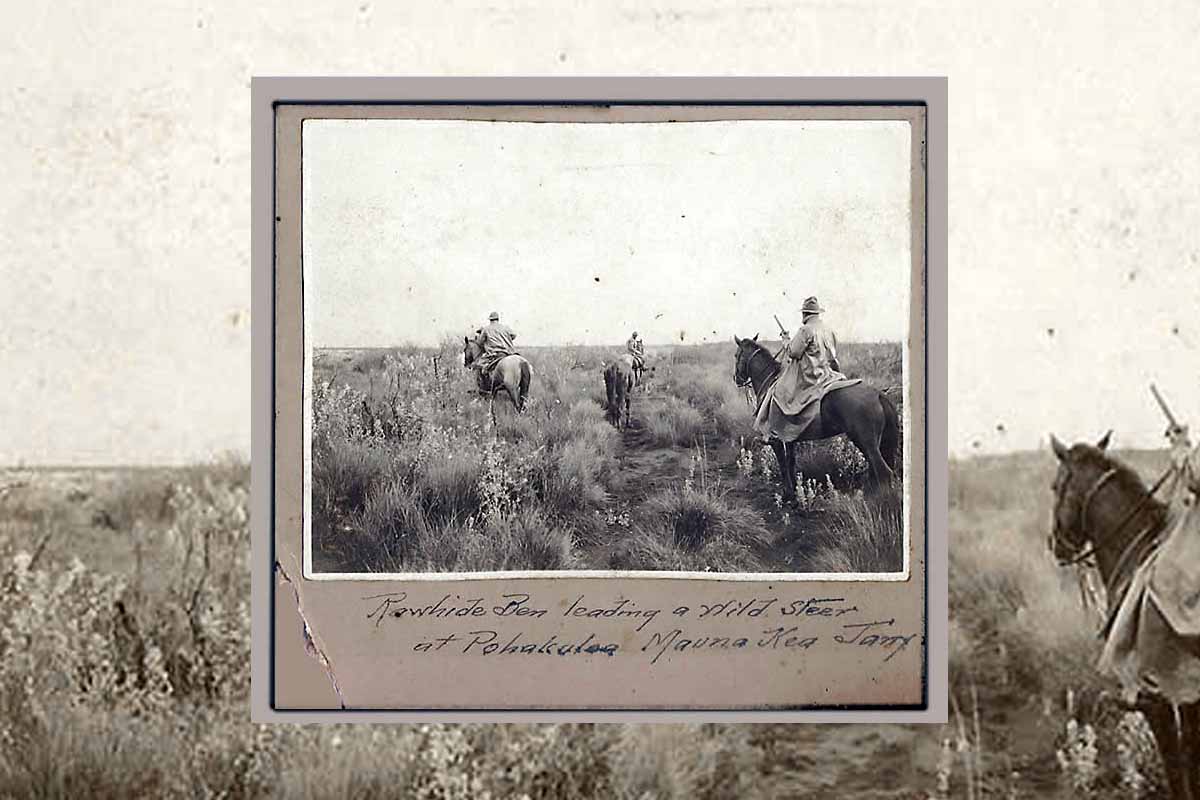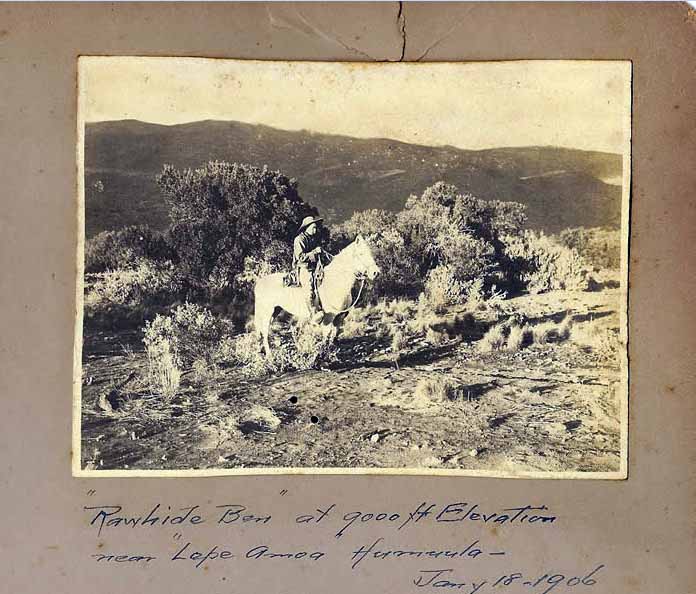
Rawhide Ben leading a wild steer at Pohakuloa Mauna Kea
Ebenezer “Rawhide Ben” Parker Low (Paniolo Hall of Fame Class of 2005) was born in Honolulu, October 4, 1864, the great grandson of John Palmer Parker I and Kipikane. He was handling cows before he was six, helping Robert Waipa, his mother’s half-brother, with the milking herd of 20-30 cows. Eben practiced roping the calves, especially those a little too eager to get to their moms.
He attended boarding school on Maui, but said himself that he had very little education, “just plain common sense plus some English grammar and arithmetic and writing.” His first paying job was at Puakea Ranch, working for Theo. H. Davies & Co., and at the age of 26 he was managing Pu‘uhue Ranch In 1887, he married Elizabeth Pu‘ukui Napoleon, and they raised four daughters and five sons in North Kohala.
At sunset, Eben always liked to look toward Hualālai, fascinated by a prominent cinder cone that he thought looked like a cake. He asked a Hawaiian man to show him how to reach the place, crossing the lava fields to what they called Pu‘uwa‘awa‘a. Not long after, he founded the 400,000-acre Pu‘uwa‘wa‘a Ranch with his brother-in-law and partner Robert Hind.

Rawhide Ben at 9000ft elevation near Lape Amoa Humuula – January 18, 1906
Eben’s grandson Sam Low has curated many of Eben’s stories on his website, including the one about how he lost part of his left arm.
It was in 1906, and Eben and some cowboys were camped on the slopes of Mauna Kea, preparing to go out hunting the wild cattle in the forest. They woke at 3 a.m., had their coffee and were getting ready to go when brother Jack Low said he had a dream that he would be killed if he went out that day. The team agreed to leave him behind.
“We rode along like mutes, no talking was allowed and the bells to our spurs were all tied and muffled as we wended our way on that trail of jangled ferns at the upper limit of the forest. It was a beautiful clear morning, cold and crisp, with a few stars still visible above…
“When the bulls got close enough for roping, I gave the order and we were off in a flash. Suddenly, the largest bull veered off and I was right on top of him, ready to make a short quick throw. Just then, my horse stepped into a hog hole and down I went. I was thrown badly but not injured. Ikua Purdy and Archie Ka‘au‘a got their bulls and one of the boys in the rear got the one I was after. I congratulated the boys for their fast and brilliant work. From that time on, the work progressed nicely …”
After a while, Eben and the boys had roped a number of cattle and started leading them down to a lower elevation. With no warning, a large, powerful animal took a hard right turn and wrapped its lead rope around a tree. Eben, one hand on the reins and one on the rope, was trapped. His rope hand slammed into the pommel of his saddle, severing it at the wrist.
“Imagine the impact and force I received when the full slack of rope ended around that tree with me on one side and the cow on the other! It looked like the cow was undertaking a triple somersault on the other end of that stout bullhide lariat which snapped like a piece of thread! I felt the shock as if I was struck by lightning…
“I was then in a severe predicament—a hundred miles from any telephone or medicine, and practically in no-man’s land as far as any assistance was concerned. The boys wanted to pack me to Hopuwai Camp, one of the sheep station’s quarters. I said that I could walk and did walk the whole way to the camp, a distance of about five or six miles, with my injured hand held up by my good one all the way.”
The men had tied his arm with a tourniquet, and they fetched a doctor as quickly as they could. He immediately amputated the badly infected hand, and after 10 days or so, the worst had passed. Eben recovered and, of course, went back to cowboying as a one-handed roper.
The following year, in 1907, Eben took some of the paniolo to Cheyenne, Wyoming to scout the world’s largest rodeo. They knew they could compete, and signed up to return the following year. Eben arranged to borrow horses from his friends at Hersig Ranch, and in 1908, he, Archie Ka‘au‘a, Jack Low and Ikua Purdy went to Cheyenne Frontier Days rodeo and made history. They stunned the World Championship Roping Competition, where Ikua won first place—roping throwing and tying the steer in 56 seconds—and Archie and Jack took third and sixth place.
In Eben’s own words, “One cannot imagine the noise of the applause our boys received from those 30,000 watchers… The kanakas had won!”
Helen Parker wrote a famous song about their victory, “Waiomina,” covered by countless Hawaiian musicians. And, 100 years later, the town of Waimea celebrated the Year of the Paniolo with a whole series of festivities, including the town’s signature “Waiomina Boot.”
Eben died in 1954 at the age of 89. His ashes are scattered on the slopes of Mauna Kea.
